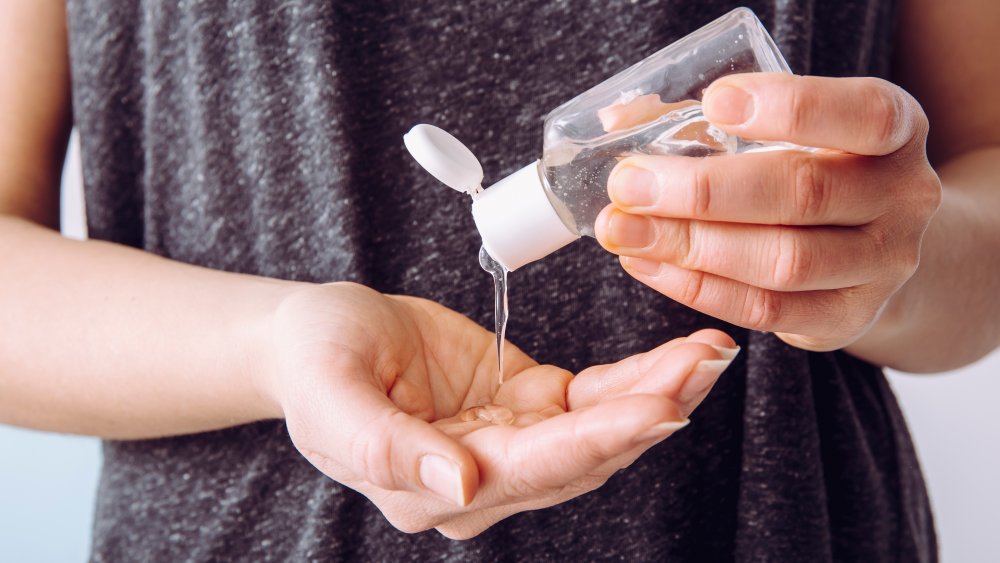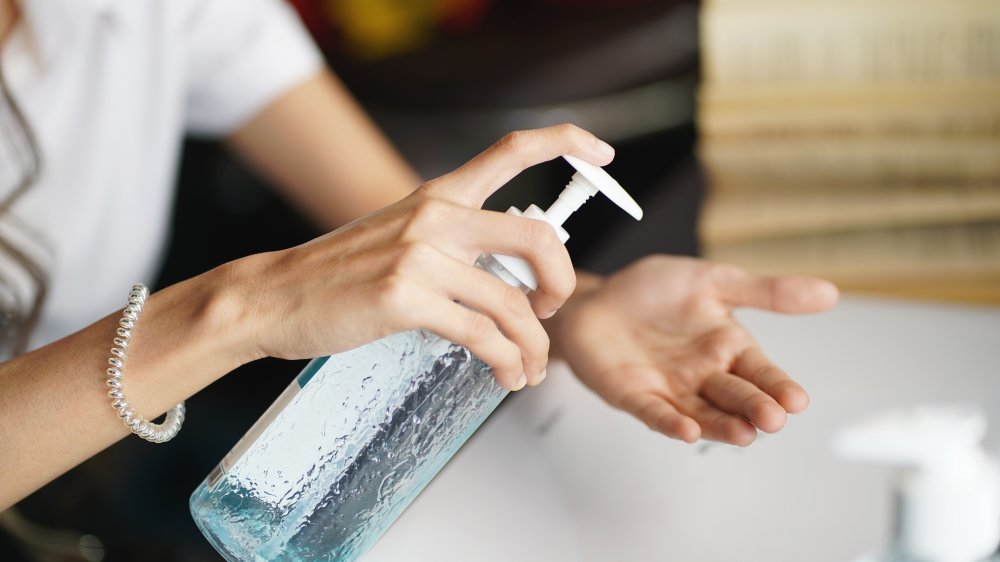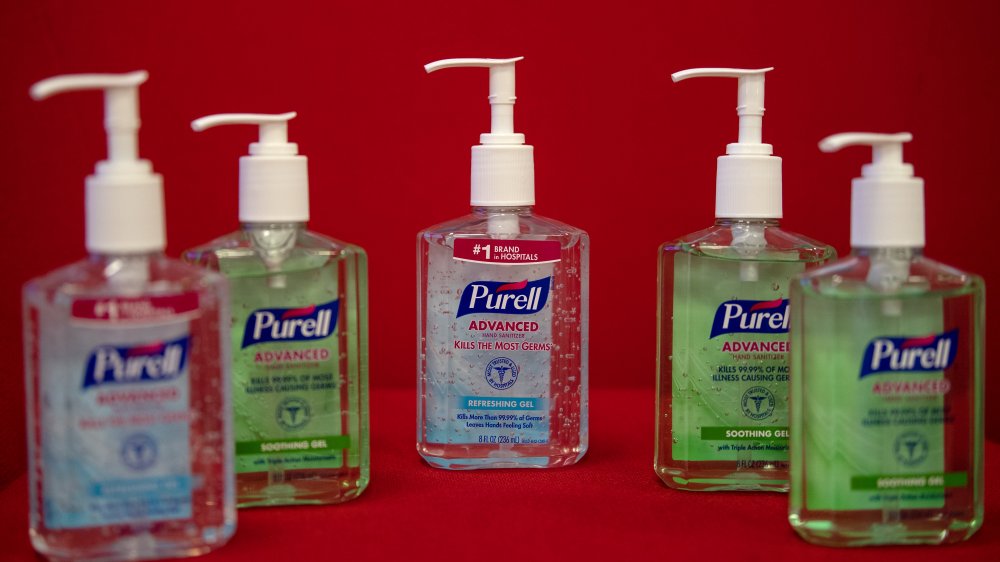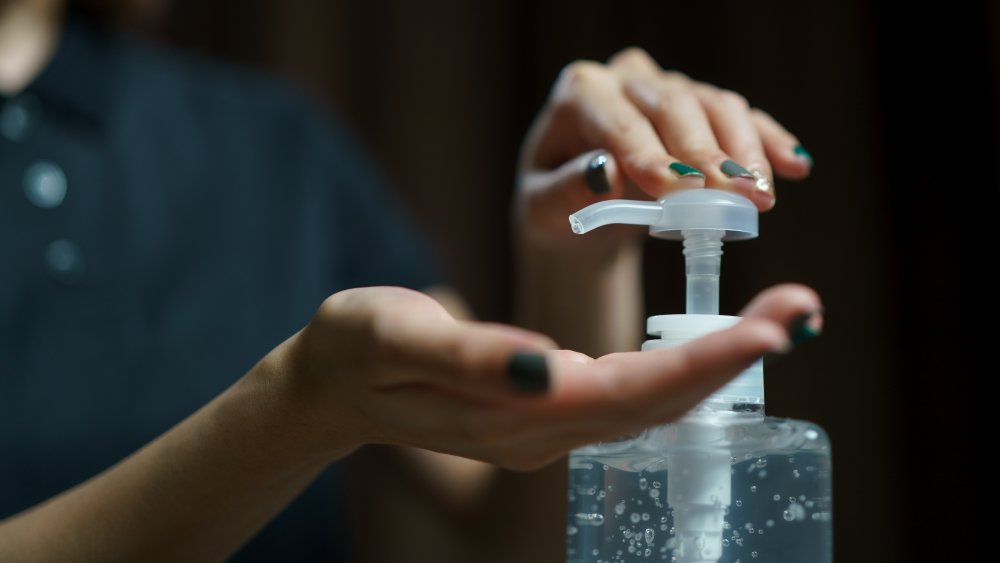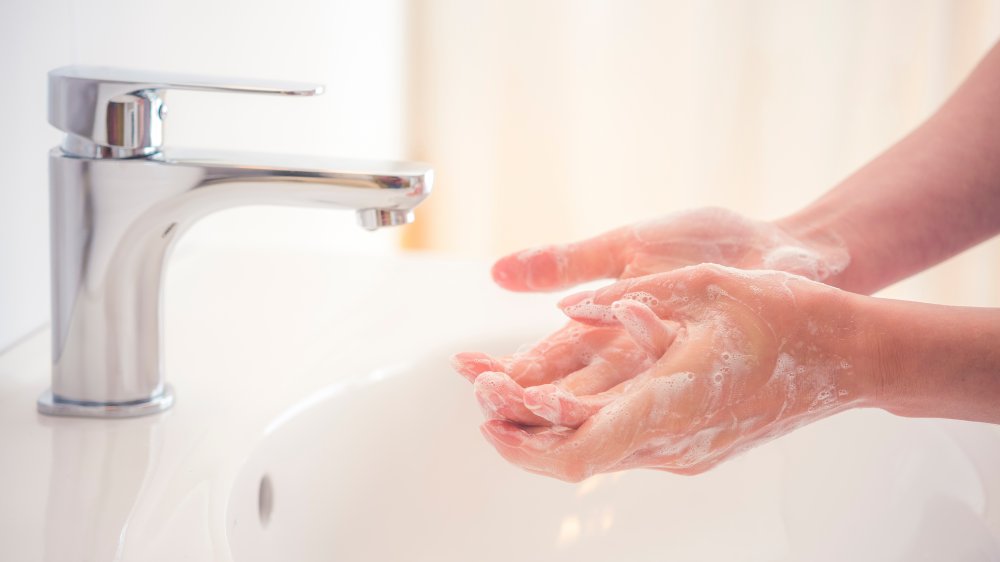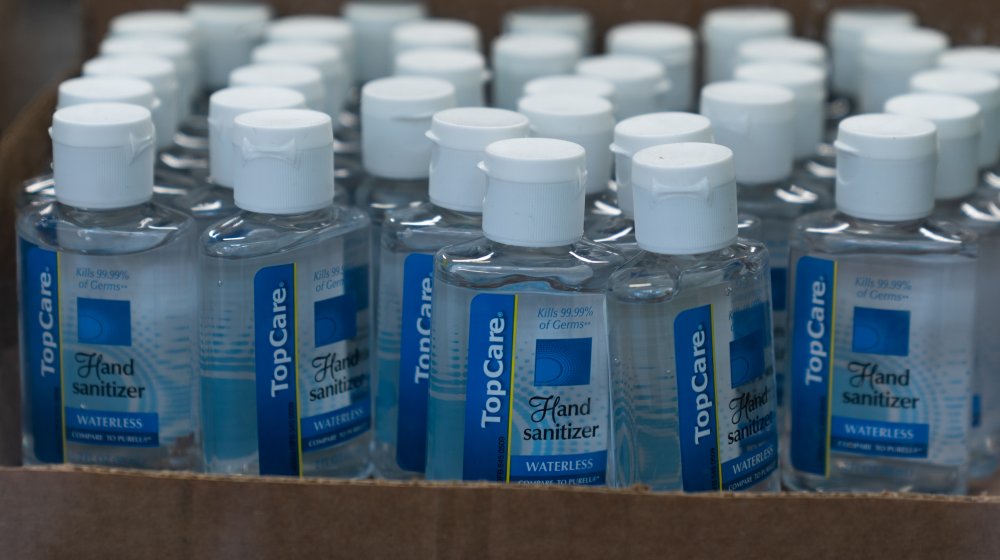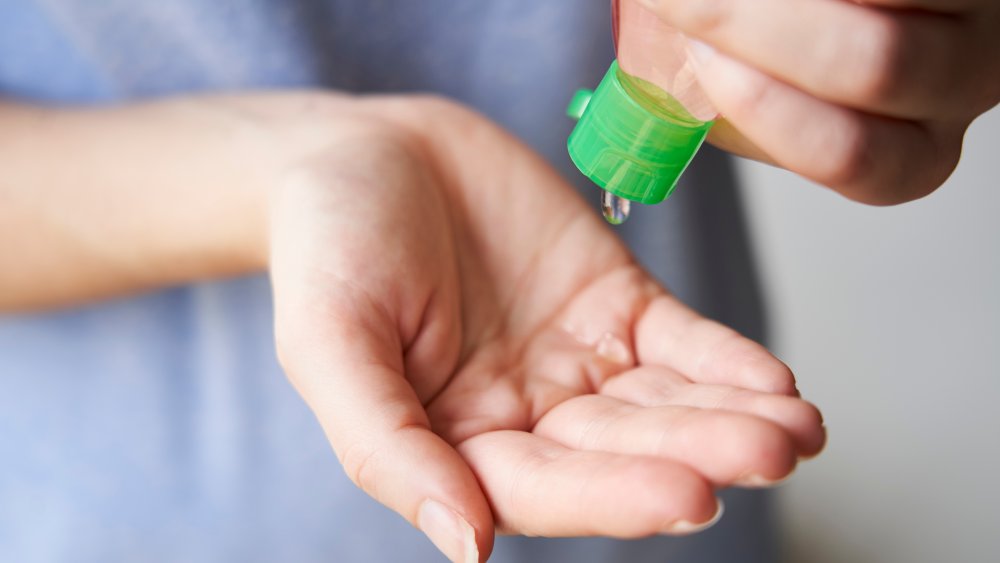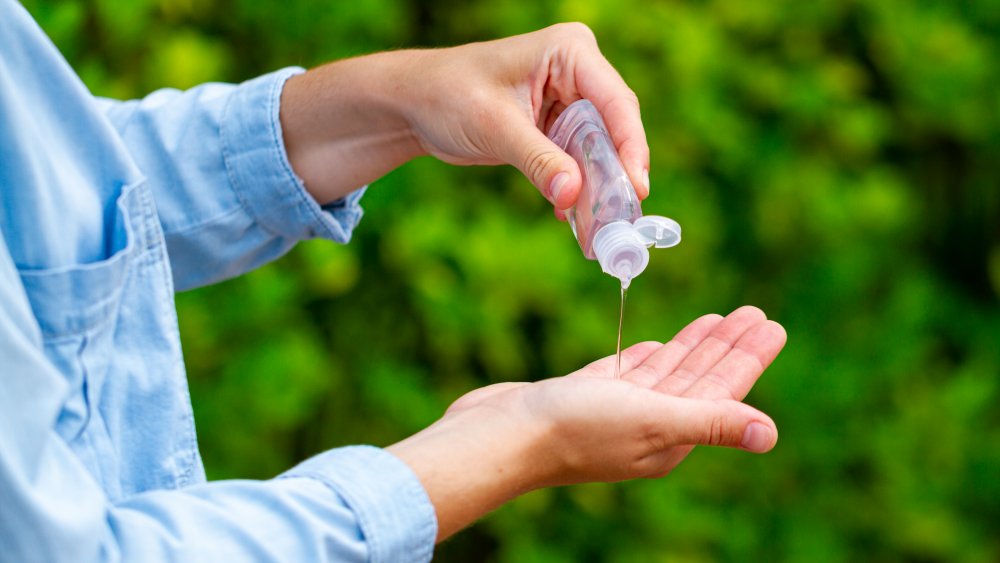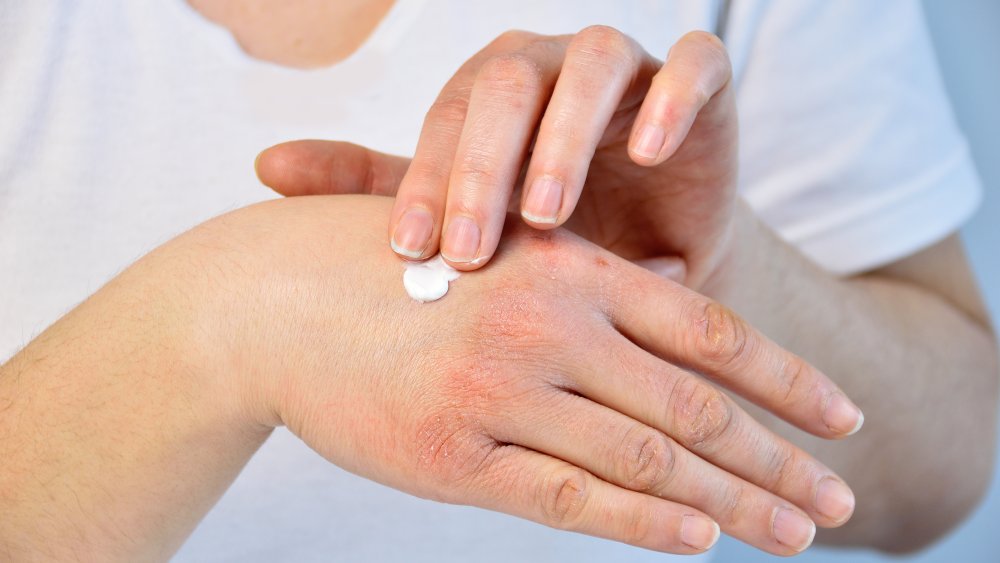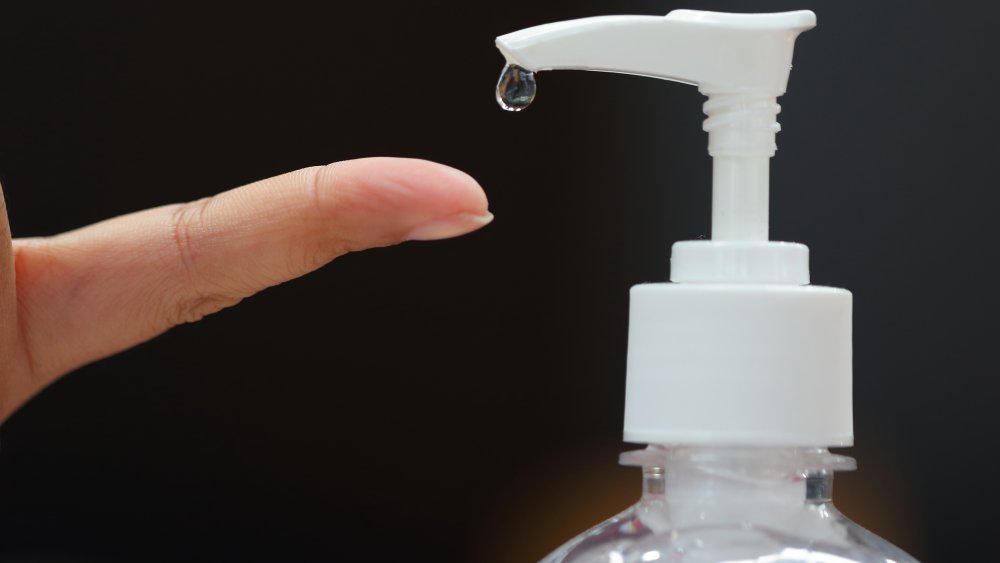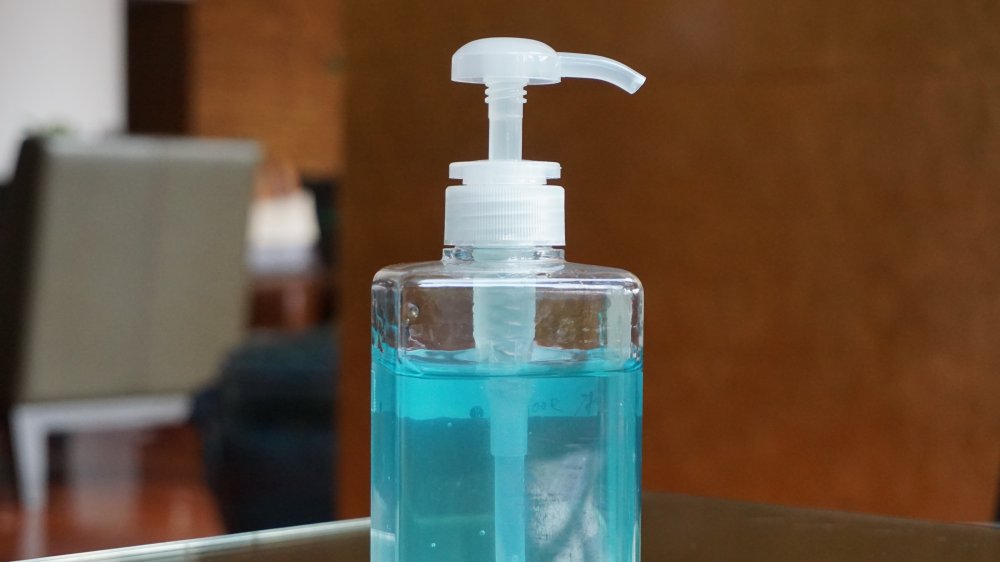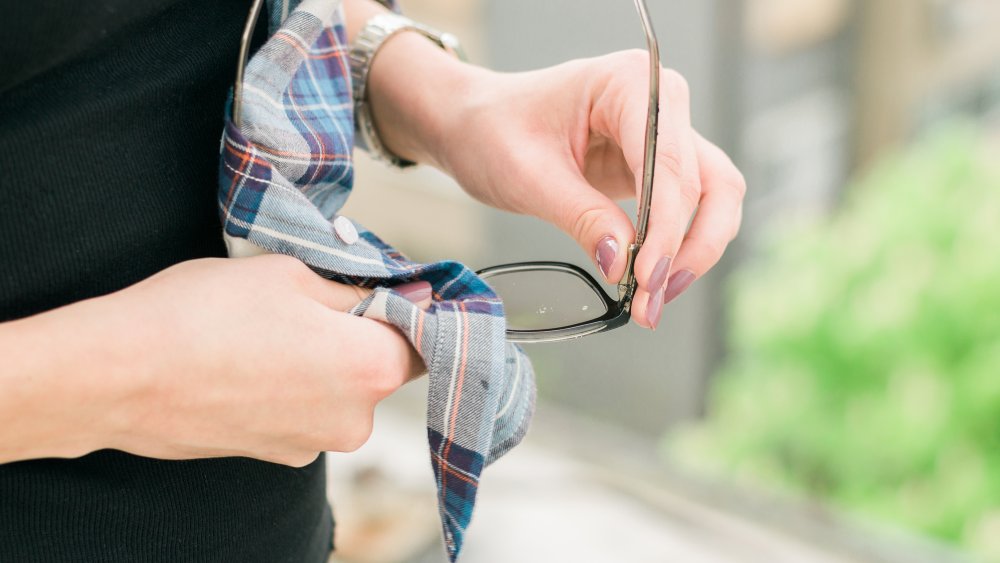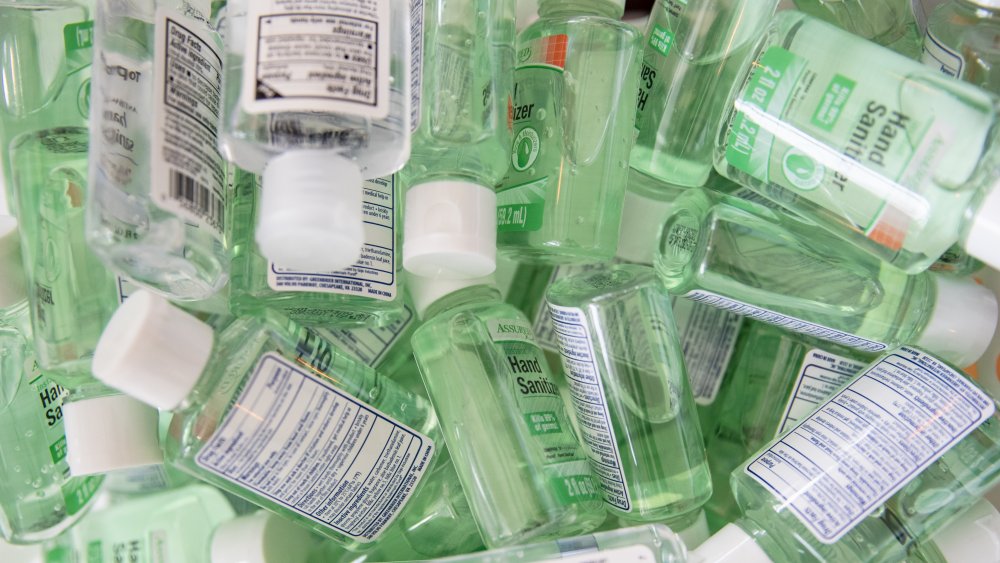The Truth About Hand Sanitizer
We may receive a commission on purchases made from links.
What would we do without hand sanitizer? It is portable, easy to use, and efficient at removing many common pathogens. Plus, it does not require running water, a luxury we sometimes do not have when we are out and about and on the go. "You can't just be in the bathroom washing your hands all day," Dr. Pritish K. Tosh, a Mayo Clinic infection disease expert, told Health. "Because of their convenience and efficacy, using [hand sanitizers] seems like a really good idea."
Nevertheless, while proper hand hygiene is of the utmost importance in staying healthy and happy, regular use of hand sanitizer is not always the answer. There are many times when it is useful, and other occasions when it is most definitely not, as noted by the Centers for Disease Control and Prevention. Plus, not all hand sanitizers are equally effective. So, before you squirt a dot of hand sanitizer into your hand — and assume that all is well and clean — let's go over the basic facts, figures, do's, and don'ts. Read on for the truth about hand sanitizer.
How does hand sanitizer work?
You rely on your favorite bottle of hand sanitizer to blast away any illness-causing germs and bacteria, but how does the product actually work? The Centers for Disease Control and Prevention notes that "alcohol-based hand sanitizers can quickly reduce the number of microbes on hands in some situations, but sanitizers do not eliminate all types of germs." Still, what is the actual science behind the efficacy of hand sanitizer?
A clever video created by the American Chemical Society's Reactions YouTube Channel said that alcohol-based hand sanitizer essentially dissolves away the outer layer of offending viruses and bacteria, causing them to burst. The active alcohol in hand sanitizer effectively "[disrupts] the protein and lipid molecules" that comprise a virus' outer membrane, thereby ruining its entire composition. In response, these germs then, essentially, "spill their guts."
So, next time you rub some alcohol-boasting hand sanitizer into your hands, you can picture all of those invisible germs meeting their ultimate demise.
Experts recommend choosing a hand sanitizer with at least 60 percent alcohol
Be sure to look at the labels on your hand sanitizer when you pick one up off of the shelf at your local pharmacy or grocery store, as not all hand sanitizers are created equal. The Centers for Disease Control recommends finding a hand sanitizer that has a minimum alcohol concentration of 60 percent. Hand sanitizers with a lower concentration of alcohol do not work as well against many different types of germs and/or simply decrease the reproduction of germs instead of flat-out eliminating them.
Dr. Andrew Alexis of Mount Sinai Hospital told Women's Health to choose a hand sanitizer that contains "ethyl alcohol, isopropyl alcohol, or benzalkonium chloride." He rounded up his top hand sanitizer choices for the magazine, and his favorites included Germ-X Moisturizing Original Hand Sanitizer, which works to preserve moisture, and Purell Advanced Hand Sanitizer, which boasts a 70 percent concentration of effective alcohol.
ProPublica noted that the aforementioned brands also produce hand sanitizers that do not contain alcohol, and they are often next their more effective counterparts on store shelves. So be sure to do your due diligence and read product labels.
This is the correct way to use hand sanitizer
There is a time and a place for using hand sanitizer. It's great when you are on the go and there is no sink or running water in sight — when you are using public transportation, going to outhouses at concerts and events, or after shaking someone's hand (hey, you don't know where that hand has been!). But to feel confident that your sanitizer is actually doing its job, you will want to ensure that you are applying it correctly with the proper technique.
In an article, VeryWell Health reminded its readers to check the label of their hand sanitizers, as different types and brands may recommend using different amounts. Next, the site recommended rubbing your hands together, making sure to get in between your fingers and continuing to do so until they are completely dry. Similar to washing hands with soap and water, the Centers for Disease Control and Prevention recommends you massage your hands together for at least 20 seconds.
In certain circumstances, it might be beneficial to use hand sanitizer as extra protection after you have washed your hands with soap and water. After all, you can never be too careful.
How does hand sanitizer stack up against hand washing?
Squeezing a bit of hand sanitizer into your palm might seem like the more convenient option, but, given the choice, you should always go for soap and H20. A study in the American Society of Microbiology's mSphere found that hand washing is a quicker and more effective means to getting the flu virus off of one's hands as opposed to using hand sanitizer. Of course, it should be noted there is a potential flaw in this result. According to Consumer Reports, the research measured the efficacy of massaging hands together with soap versus squirting sanitizer into hands without rubbing them together. Ryohei Hirose, the study's author, acknowledged this misgiving, saying that working the sanitizer into one's hands could "speed up the distribution of the alcohol across your skin."
Still, there are actually circumstances when a quick squirt of hand sanitizer is considered helpful. The findings supported the idea that hand sanitizer benefits healthcare workers who need to go from one hospital room to the next with speed, as noted by Consumer Reports. Other studies, as cited in VeryWell Health, found that it's effective when used strategically in daycare centers and schools.
Despite this, it's important to realize that, unlike soap and water, hand sanitizers do not kill certain common germs, including the notorious norovirus, according to VeryWell Health.
This is when you shouldn't use hand sanitizer
As a rule of thumb, if you can actually see dirt, grease, and oil on your hands, stick to washing them with soap and water. According to the Centers for Disease Control, hand sanitizer is not as effective if your hands are visibly dirty. So if you are a car mechanic or a gardener, you will want to get acquainted with the nearest bathroom. Likewise, when the little ones are digging in the dirt in your backyard or playing at the local park, you will need to find a public washroom to properly clean their hands.
Dr. Tanaya Bhowmick, an assistant infectious diseases professor at Robert Wood Johnson Medical School, told Health that applying hand sanitizer to dirt-covered hands will not cut it, and you will see right away that you are essentially "just adding sanitizer to the mix." She added, "If you have dirt on your hands and you put alcohol on it, you're really just creating a slurry."
Of course, something is better than nothing, so, if you do not have the alternative of soap and water, a little hand sanitizer will temporarily have to do until you can get to a sink, per the CDC.
Could hand sanitizer contribute to antibiotic resistance?
Be cautious about choosing hand sanitizers made with triclosan. While the FDA banned the use of this ingredient in antibacterial soaps in 2016, per WebMD, it is very possible you might still have these products in your stored stockpile. The facts are hazy at best, with the FDA noting that there is no definitive answer about the safety of triclosan — mostly because there are few existing studies that directly involve humans. Still, the FDA noted in a statement cited by WebMD, that some information "suggests that antibacterial ingredients may do more harm than good over the long-term."
One concern, noted by The Street, is that the overuse of triclosan can lead to the creation of antibiotic-resistant bacteria. This means that, over time, it could be harder to treat potential bacterial infections. Additionally, WebMD, cites evidence that the antibacterial agent can affect reproduction: "Animal studies have linked triclosan to lower testosterone levels and less sperm production. ... There's too little human research to say whether triclosan would affect people in a similar way."
What happens when you swallow hand sanitizer
You will want to take caution with your hand sanitizer. While it may seem harmless enough, it is certainly not something you should freely give young children without proper supervision. If accidentally (or purposely) consumed, hand sanitizer could lead to a case of alcohol poisoning. The Centers for Disease Control and Prevention noted that between the years of 2011 and 2015, there were almost 85,000 calls to poison-control centers about the potential consumption of hand sanitizer among kids. Furthermore, the CDC shared that young kids might be drawn to more colorful and fragrant hand sanitizers.
Poison Control has explained that, just like other products containing alcohol — such as mouthwash and facial toner — hand sanitizer poses a risk to children if used improperly. If a child drinks hand sanitizer, their blood sugar could potentially plummet, causing coma and seizures in extreme cases. Ingesting hand sanitizer could also make a child inebriated, possibly causing a decrease in heart rate and labored breathing, per Poison Control.
The moral of the story is to keep an eye on young children. Better yet, keep the hand sanitizer bottle in your adult grasp and squeeze a dab into their little hands.
Over-using hand sanitizer can dry out your skin
Frequently washing with soap and water and over-using hand sanitizing products could make your hands feel dry, cracked, and uncomfortable. That is because, as noted by Shape, the active ingredient (alcohol) "strips the barrier of essential proteins and lipids, resulting in irritation." While being vigilant about staying clean and germ-free is, indeed, very important, so is keeping your skin healthy and smooth. That is why you will want to have moisturizer at the ready after using hand sanitizer.
Some hand sanitizers are made with ingredients meant to prevent the unpleasant side effect of dry skin. Glycerol, for example, can help counteract the drying properties of alcohol, as noted in an educational video from the American Chemical Society's Reactions YouTube channel. This chemical also gives many hand sanitizers its "goopiness." Without this nifty ingredient, hand sanitizer would be a liquid — and it would not be nearly as convenient for use on the go.
You can make your own batch of hand sanitizer in a pinch
Can't get your paws on a bottle of hand sanitizer? In the midst of a viral outbreak or during flu season, hand sanitizer can be considered a precious commodity, coveted by the masses. Fortunately, if you are having trouble finding it on store shelves, you can make your own batch with a few essential ingredients. Not one for recipes? Don't worry — it's rather simple.
According to Healthline, you will need isopropyl alcohol or rubbing alcohol, an aloe vera gel, and either a fragrant essential oil or lemon juice. "The key to making an effective, germ-busting hand sanitizer is to stick to a 2:1 proportion of alcohol to aloe vera," Healthline noted. "This keeps the alcohol content around 60 percent. This is the minimum amount needed to kill most germs."
Dr. Jagdish Khubchandani, a Ball State University health science professor, shared a few DIY tips with the site. First, you should always make your hand sanitizer in a clean space with thoroughly washed hands. He also instructed that people should stir the ingredients well until completely blended and avoid touching the concoction until it is done.
However, please note that your DIY hand sanitizer probably won't totally combat germs that spread diseases like coronavirus, so please keep washing your hands with soap and water!
Hand sanitizer can kill sperm
Sperm is extremely delicate. Like certain spermicides, hand sanitizer products contain chemicals — like isopropyl alcohol and glycerin — that can slow down or even kill those little swimming cells upon contact, according to an article published in Healthline.
However, even though it is technically able to eliminate sperm, one should never ever use hand sanitizer in place of safe, approved, and effective spermicide products. Hand sanitizer is not an acceptable contraceptive alternative in any situation, and, in fact, using it could prove to be potentially dangerous and damaging to the outer skin of the penis and the fragile inner tissue of the vagina, per the medical experts at Healthline. You obviously would not use household cleaners on or in your body, so the same goes for hand sanitizer, of course. You should stick to spermicides and other actual birth control products for contraceptive use, and leave that bottle of sanitizer for, you know, cleaning your hands.
You can use hand sanitizer as deodorant
We have all had those days when we run out the door, only to realize an hour or two later that — oops — we forgot to put on deodorant. Luckily, there is a hack for that! Yes, you can stay dry and feel fresh with a little improvisation and a healthy amount of hand sanitizer. According to PureWow, a dot of hand sanitizer for each arm pit will do the trick. Just let it air dry. The alcohol in hand sanitizer works to kill odor-causing bacteria and reduce sweat, as noted by the site. A fragrance-free hand sanitizer is preferable, but you can use whatever one you happen to have with you on the go.
It turns out that hand sanitizer has a few other nifty in-a-pinch purposes, too. You can dab a dot on a pimple or bug bite to reduce inflammation. What's more, you can run a bit through the roots of your hair to reduce oiliness in lieu of dry shampoo, as noted by the site.
There are some surprising uses for hand sanitizer around the house
It turns out that your trusty hand sanitizer is a multipurpose tool. It can be used for lots of household needs when you are in a bind. If you need to buff and polish the silverware, you can squirt a little bit of hand sanitizer into a dry cloth and use it to remove stains and tarnishes, according to the DIY pros at Home Depot. But when using it for this purpose, try to avoid one with that contains aloe vera and has an added fragrance, as advised by How Stuff Works.
When you are on the go, you can also grab your hand sanitizer in lieu of other simple products, as suggested by Apartment Therapy. Use it to sanitize germ-ridden cell phones, clean a pair of glasses, wipe down a public toilet seat, or cleanse a yoga mat at the gym. Consider it your pocket-size all-in-one multitasker.
During a shortage, hand sanitizer can be mass-produced by distilleries and other facilities
When there is a shortage of hand sanitizer available for public purchase — like during the 2020 coronavirus pandemic — some liquor distilleries have done their part for the greater good. CNN found that multiple distilleries throughout the country temporarily turned their facilities into veritable hand sanitizer factories.
In a social media post, Old Fourth Distillery in Atlanta, Ga., humbly shared its efforts to help people get access to hand sanitizer during the COVID-19 outbreak, since store shelves were bare. The Instagram caption read, "Due to the recent reports of outages and low supply in our community, we have decided to provide hand sanitizer free of charge to anyone in need. Made with aloe vera gel and 95% ethanol."
Similarly in France, LVMH facilities, normally dedicated to producing cosmetic and perfume products, vowed to use their space to help build up the supply of hand sanitizer, as reported by Allure. Sanitizer was to be "distributed free of charge to the Assistance Publique Hôpitaux de Paris, a medical treatment and education system including 39 public hospitals that serve Paris and the surrounding areas," as noted by the article.
